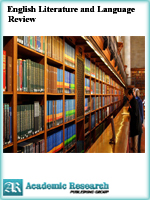English Literature and Language Review
Online ISSN: 2412-1703
Print ISSN: 2413-8827
Print ISSN: 2413-8827
Quarterly Published (4 Issues Per Year)

Archives
Volume 7 Number 3 September 2021
Analysis of the Thematic Progression Patterns in English News Discourse
Authors: Wang Shuya
Pages: 59-63
DOI: doi.org/10.32861/ellr.73.59.63
Abstract
The theory of theme and rheme and the patterns of thematic progression are not only two important parts of the systemic functional grammar but also an important means of discourse analysis. With thematic structure theory and patterns of thematic progression as the theoretical support, this research makes a combination of theoretical research and discourse analysis. This paper aims to find out the application and characteristics of the theme and rheme structure in English news discourse. After choosing the data from BBC (website:https://www.bbc.com/news/world-asia-china-51403795) reporting on 7th February 2020 with the title of Li Wenliang: Coronavirus Kills Chinese Whistleblower Doctor and giving a detailed analysis by empirical study. Through the analysis of the relationship between theme and rheme in the full text, we find that this text does not only apply a certain thematic progression pattern, but also applies more than one thematic progression pattern. Therefore, we come to the conclusion that thematic progression does exist in this news discourse and shows obvious characteristics and distribution. And also, parallel pattern and continuation pattern are frequently presented in this news discourse.
On the Role Played by Project-Based Learning in Teacher Training Online
Authors: Silvia Sánchez Calderón ; María Ángeles Escobar Álvarez
Pages: 47-58
DOI: doi.org/10.32861/ellr.73.47.58
Abstract
This work investigates the perceptions on the role played by Project-Based Learning (PBL) in English as a second language (L2 English) participants who are receiving teacher training online. The participants in this study were enrolled in the Psycholinguistic Analysis of English Acquisition module at xxx-removed for blind review. They were given the choice of two projects: (a) an L2 English learner linguistic profile and (b) a grammatical structure analysis and its L2 English teaching application. The participants’ opinions about PBL were then collected in a questionnaire that included the following variables: motivation and attitude towards L2 English learning before and after the project, perception of the development of English language proficiency skills, content acquisition, and other issues related to PBL such as L2 learning reflection; and, autonomy and real language use. They reported having learned by doing and, as a consequence, believed that they had learned autonomously because they were responsible for their own learning. Likewise, they claimed PBL facilitated critical thinking, creativity, language awareness, and professional development through the project completion. They also showed a positive attitude towards the integration of the four language skills and the building of content knowledge by gathering and planning information using authentic resources.



